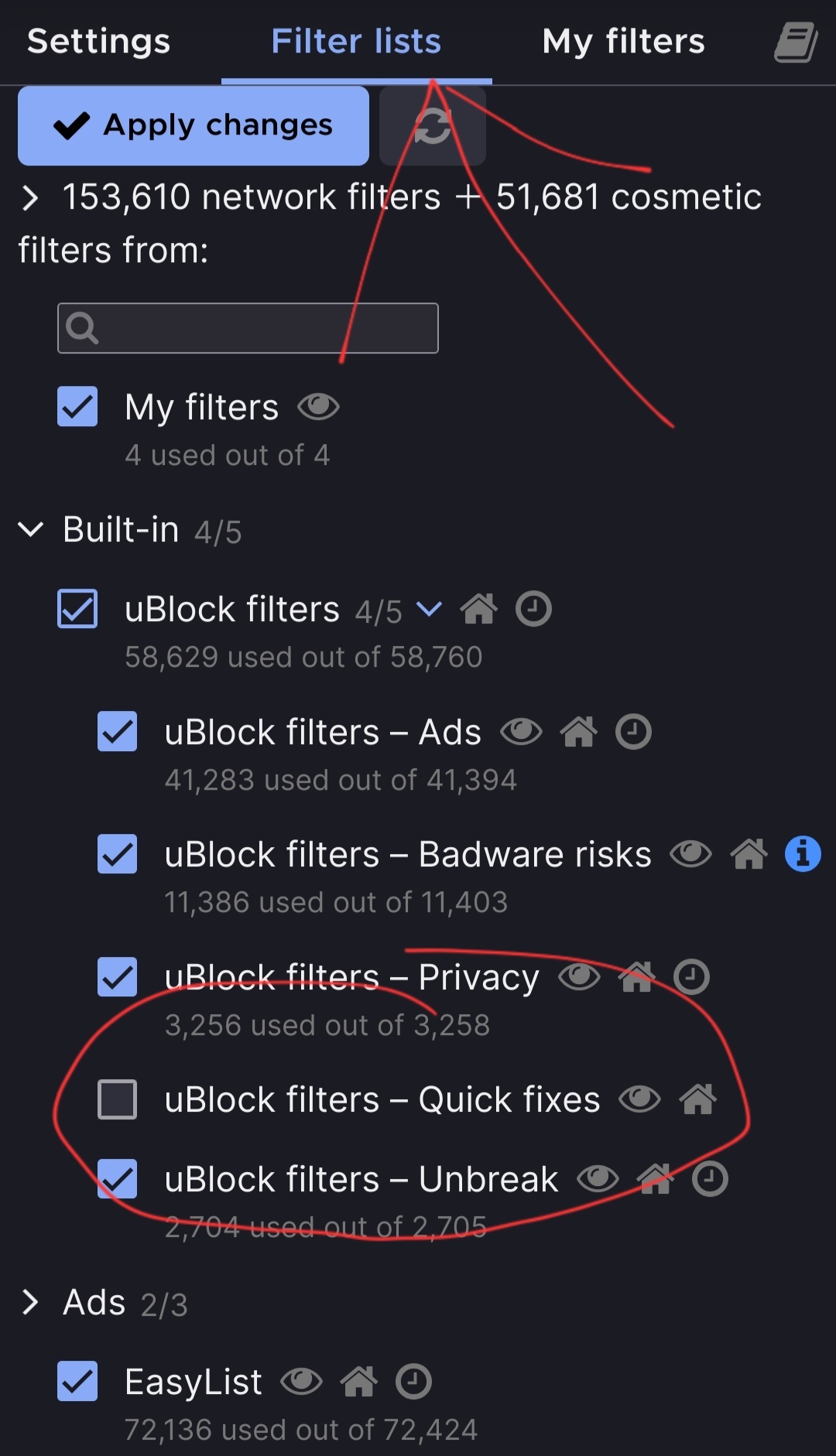My old boss used to die of cringe any time I started humming this song at the office.
rudyharrelson
Summer of 2020. Lockdown was in full effect and I was working from home. I wouldn't say I had a lot of extra free time (my kid was 1 year old at the time, lol), but I spent many hours that Summer tinkering with various projects, and that led me to eventually adopt Linux as my daily driver on all my machines.
I've dabbled with Linux since 2005, but was never savvy enough to completely ditch Windows until 2020.
If uBlock Origin was working fine until recently, you can try this workaround (it worked for me when YouTube suddenly started showing me "Ad blockers are against YouTube TOS" messages):
Open uBlock settings in Firefox, go to "Filter Lists" and uncheck "uBlock Filters - Quick fixes" under "Built-in".

Then click "Apply changes" and restart Firefox. Hope this helps.
Is it as interactive as Lemmy or is everyone kinda shouting into the void?
I'd say it's a somewhat different kind of interactivity than Lemmy. Your typical Mastodon user won't have many followers, but that doesn't mean you're "shouting into the void". Similar to Lemmy, you can comment on (reply to) others' posts and lots of other people can join in the discussion that way.
Is there an equivalent to communities?
Not really, but you can follow hashtags for whatever topics you're interested in. Or follow an account for something you're interested in (e.g.: organizations, weather, hobby news, content creators, etc)
If not, how do you find stuff you care about?
Follow people/organizations/tags that you find interesting and their posts will populate your feed.
And is reblogging the equivalent to upvoting? Is it like a like and share in one?
Not necessarily. Reblogging ("boosting" on Mastodon) is just putting more eyes on someone else's post by sharing it; it isn't equivalent to an endorsement per se. You can favorite posts on Mastodon, but I don't think there's really an equivalent to a "like" or "upvote" button.
Do they have memes there or what’s the range of content?
The range of content is as wide as anywhere else, memes and all. Can vary from instance to instance, though. (e.g.: code of conduct on mastodon.social may be different from fosstodon.org's)
How does it compare to bluesky? I have used bluesky but the tone there is kinda shallow imo, rarely any meaningful interactions.
I haven't used bluesky, so I can't comment on this one.
I haven't had to deal with this specific kind of use case before (accessing the local Jellyfin service while the laptop is connected to a VPN), but after some cursory research, one of these approaches may work for you:
Easy Option (only available on some VPN software):
There may be an option in your VPN client that lets you access local network addresses like your Jellyfin server. Check your settings and see if there are any options like "allow local network traffic" and then try opening up your Jellyfin server in a browser (e.g.: http://192.168.1.100:8096/)
Less Easy Option:
If your VPN client doesn't have an option for allowing local traffic, you can open up the command prompt on your macbook and run a command like this:
sudo route add -net 192.168.1.0/24 192.168.1.1
Where 192.168.1.0/24 is the local network you want to connect to (where the Jellyfin server is located), and 192.168.1.1 is your local gateway (probably your wifi router's address). Change both of these depending on how your network's local IPs are formatted.
This should update your routing table to handle local network addresses without the VPN and this should persist between reboots.
Hope this helps.
Her science-oriented methods break down when it comes to (in the broadest sense) “supernatural” phenomena - because they are, by definition even, outside science.
I only watched the first 2 or 3 seasons of The X-Files, so I there's lots of episodes I haven't seen, but this seems incorrect to me. Scully and Mulder were chasing unexplained phenomena, which are entirely within the realm of science. Humans tend to call things "supernatural" when we don't know how to explain them (ghosts, monsters, aliens, etc), but those entities (in the context of The X-Files where they are actually real), once observed, can be subjected to the scientific method the same as anything else. Aliens and cryptids and such in The X-Files aren't magic; it's just extremely rare for humans to be able to observe and study them.

Derivatives started making more sense to me after I started learning their practical applications in physics class.
d/dxwas too abstract when learning it in precalc, but once physics introducedd/dt(change with respect to time t), it made derivative formulas feel more intuitive, like "velocity is the change in position with respect to time, which the derivative of position" and "acceleration is the change in velocity with respect to time, which is the derivative of velocity"